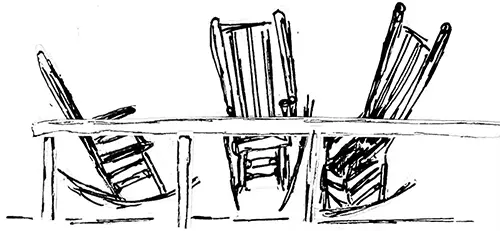The Wittenberg Door 157
Reading Reality (and Watching for Bric-à-Brac on Our Windowsill)
Christian monastic pioneers saw that books left on the windowsill are more likely to make an impression on those outside than on those within.
A Christmas Tree You Don’t Know Beans About
The locust tree is a rare symbol of Christmas and Easter as one.
What Is Your Vote?
I’m not asking what candidate you support. What I am asking you to consider is what does your vote constitute? This question was spurred by Jeff Bilbro’s thought-provoking essay here…
Last Rites for Local Parishes: On the Decline of Catholic Chicago
A church that prides itself on its universality—its catholicity—has served as a seedbed for hundreds of parishes divided along ethnic lines.
Dying Properly—like a Dumb Ass (A Dispatch)
Little do I know that in a few days I will have died properly: by explosion.
Grace is the Currency of the True Economy
Theologians have long used the language of economics to help explain God’s ways. They often focus on redemption as a kind of transaction. I think this is just one aspect…
Institutionally Challenged? Obadiah to the Rescue
By God’s grace, this child of parachurch upbringing coupled with a healthy dose of American independence is growing in his appreciation for the institution ordained by God.
To a Hare, From a Louse
But on this day, I am the louse. It’s my “impudence” and “cursed speed” that has made me break what little union I had with my fellow mortals.
Wal-Mart Churches and the Need for Community
The truth is that many American Christians do not want a local church. We’re too independent and consumeristic for that.
Nisi Crederet, non Caperet
Beauty is the beginning and end of all true knowledge: really to know, one must first love, and having known, one must finally delight; only this “corresponds” to the Trinitarian…
Asceticism is for Everyone
Those who are inclined to agree with Patrick Deneen (and others) that liberalism has indeed failed may ask what way of life would be more conducive to human flourishing. Deneen…
Rise Up, O Saints, and Plant Gardens
Jake Meador’s In Search of the Common Good: Christian Fidelity in a Fractured World is a remarkably successful attempt to bring together the core teachings of Christianity and the community-centered…
In Praise of Religion’s Dark Side
The dark side of religion cannot be completely vanquished because human reason pales in the comparison to the highest reality, which is known through the light and the darkness of…
Building Folklore Wealth
Our lives depend upon the restoration of intergenerational stability within our local communities as a norm that is loved and nurtured. Moreover, our recent obsession with measures such as GDP…
Before Ahmari and French, Wills and Bozell
This is awfully late but perhaps also timely (since the spat between Sohrab Ahmari and David French seems to have a long shelf life). What follows is the talk I…
“Ora et Anti-Labora”? Kathryn Tanner on Finance Capitalism
The mighty cosmos of the modern economic order determines, with overwhelming coercion, the style of life not only of those directly involved in business but of every individual who is born into…
Notre Dame and the Need for the Past
We know now that much of the Notre Dame Cathedral survived and that it will be rebuilt. But while the fire at the Notre Dame Cathedral burned, Americans mourned. They…
Salvaging: Boat Trailers, T.S. Eliot, and Resurrection
I do not know much about gods; but I think that the river Is a strong brown god— . . . Unhonoured, unpropitiated By worshippers of the machine, but waiting,…
Conservatism and the Ecological Crisis
Conservation is at the heart of conservatism. And the root of our contemporary ecological crisis is a careless, profligate mode of relating to the world; Francis Bacon would be proud…
Some Reservations: Thinking about Native American Spirituality
I remember being held. I remember, though it was the desert, being cold. I remember the feathers of a headdress, coming up like the sun from behind red boulder. My…
What Is Radical Christianity?
This may be a tad tardy, but Jeff Bilbro's write-up and assessment of the conference about Patrick Deneen's Why Liberalism Failed caught my eye for several reasons. One was the…
The Saint of the City Goes Rural: Dorothy Day and the Life of the Land
In the Christian imagination, Dorothy Day looms as one of the 20th century’s great saints. A Communist convert to Christianity and co-founder of the Catholic Worker movement, her work among…
Fierce Velleity: Poetry as Antidote to Acedia
In “Lying,” the late Richard Wilbur diagnoses one of our age’s endemic ills with the paradoxical phrase “fierce velleity.” For those of us who don’t use “velleity” every day, the…
Avoiding “A World Without Women,” or Porches
A common and often valid critique of many families in the homeschooling movement is that, because of a lingering obsession on, and invisible competition with, the thing they are leaving…








